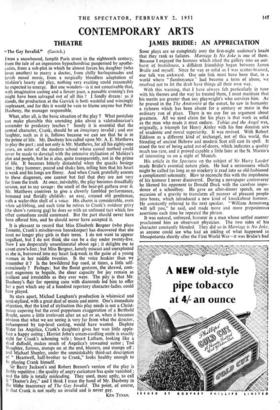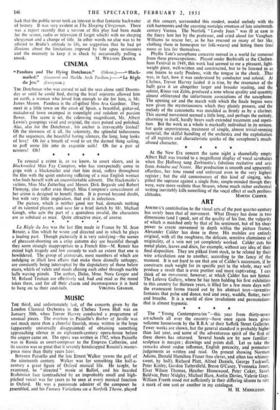JAMES BRIDIE : AN APPRECIATION
SOME plays arc so completely over the first-night audience's heads that they rank •as failures. Marriage Is No Joke is one of them. Because I .enjoyed the humour which irked the gallery into an out- burst of brutishness, a diffident friendship began between James Bridie and myself. Since he was as solid as I was scatter-brained, our talk was awkward. Our sole link must have been that, in a world where " flamboyance " had become a term of abuse, we resolved not to let the drab have things all their own way.
With this warning, that I have always felt particularly in tuna with his themes and the way he treated them, I must maintain that his merits are greater than any playwright's who survives him. As he proved in the The Anatomist at the outset, he saw in humanity a richness which has been absent for a century or more in the ordinary run of plays. There is no cue for an argument about greatness. All we need claim for his plays is that work as solid as the man who made it must endure. Tobias and the Angel was, originally, a triumph for Henry Ainley with his fine donnish airs of academic and moral superiority. It was revived. With Robert Eddison as a different kind of archangel, not of this world, the blending of ancient Hebrew and modern Scot still cast its spell. it stood the test of being acted out-of-doors, which indicates a quality much too rare, and it proved capable a little later at the St. Martin's of interesting us on a night of Munich.
His article in the Spectator on the subject of Sir Harry Lauder made Bridie's essential nature plain. He had a seriousness which might be called (as long as no mockery is read into so old-fashioned a compliment) solemnity. How to reconcile this with the impishness of his humour I never discovered. During a newspaper controversy he likened his opponent to Donald Duck with the carefree impu- dence of a schoolboy. He gave an after-dinner speech, on an occasion of a gravity to transform all manner of pleasant people into bores, which introduced a new kind of knockabout humour. He constantly referred to the next speaker. " William Armstrong will tell you," he said, and made more and more preposterous assertions each time he repeated the phrase.
It was natural, unforced, humour in a man whose settled manner proclaimed him an observant physician. The two sides of his character constantly blended. They did so in Marriage is No Joke, as anyone could see who had an inkling of what happened in Mesopotamia shortly after the First World War—it was Bridie's bad
luck that the public never took an interest in that fantastic backwater of history. It was very evident in The Sleeping Clergyman. There was a report recently that a version of this play had been made for the screen, radio or television (I forget which) with no sleeping clergyman and a change of title. In other words no clue was to be offered to Bridle's attitude to life, no suggestion that he had 90 illusions about the limitations imposed by fate upon seriousness and the necessity to keep it in check by occasionally pulling a



































 Previous page
Previous page